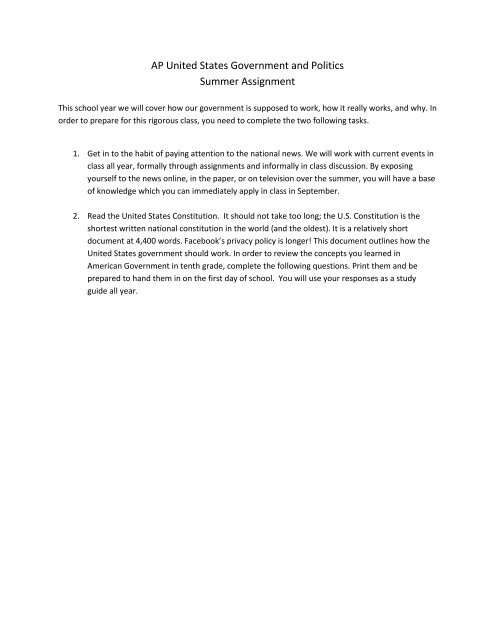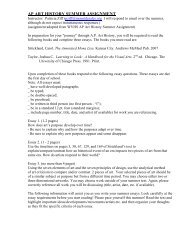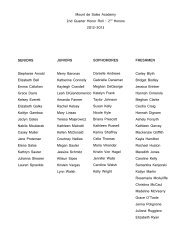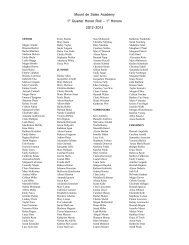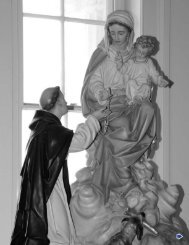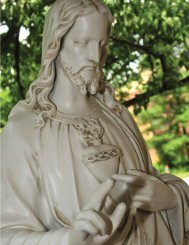AP United States Government and Politics Summer Assignment
AP United States Government and Politics - Mount de Sales Academy
AP United States Government and Politics - Mount de Sales Academy
- No tags were found...
Create successful ePaper yourself
Turn your PDF publications into a flip-book with our unique Google optimized e-Paper software.
<strong>AP</strong> <strong>United</strong> <strong>States</strong> <strong>Government</strong> <strong>and</strong> <strong>Politics</strong><br />
<strong>Summer</strong> <strong>Assignment</strong><br />
This school year we will cover how our government is supposed to work, how it really works, <strong>and</strong> why. In<br />
order to prepare for this rigorous class, you need to complete the two following tasks.<br />
1. Get in to the habit of paying attention to the national news. We will work with current events in<br />
class all year, formally through assignments <strong>and</strong> informally in class discussion. By exposing<br />
yourself to the news online, in the paper, or on television over the summer, you will have a base<br />
of knowledge which you can immediately apply in class in September.<br />
2. Read the <strong>United</strong> <strong>States</strong> Constitution. It should not take too long; the U.S. Constitution is the<br />
shortest written national constitution in the world (<strong>and</strong> the oldest). It is a relatively short<br />
document at 4,400 words. Facebook’s privacy policy is longer! This document outlines how the<br />
<strong>United</strong> <strong>States</strong> government should work. In order to review the concepts you learned in<br />
American <strong>Government</strong> in tenth grade, complete the following questions. Print them <strong>and</strong> be<br />
prepared to h<strong>and</strong> them in on the first day of school. You will use your responses as a study<br />
guide all year.
Name ____________________________________<br />
Block________<br />
<strong>AP</strong> <strong>United</strong> <strong>States</strong> <strong>Government</strong> <strong>and</strong> <strong>Politics</strong><br />
Constitution <strong>Assignment</strong><br />
You can find the text of the Constitution in many places. I recommend the following site.<br />
http://ratify.constitutioncenter.org/constitution<br />
Unless otherwise instructed, you do not need to write in complete sentences, but make sure your<br />
meaning is clear.<br />
Write in your own words. Do not quote the Constitution. I know what it says; I want to know if you<br />
underst<strong>and</strong> the words of the document. If you do not underst<strong>and</strong> what a word or phrase means, look it<br />
up. Some words, like ratify, have specific, legal meanings <strong>and</strong> should not be substituted.<br />
1. Read the 7 articles of the Constitution. In one sentence for each, summarize the general topic<br />
covered in each article. If you use the recommended web site, the phrase that pops up when<br />
you scroll over the article’s box is not sufficient.<br />
Article I<br />
Article II<br />
Article III<br />
Article IV<br />
Article V<br />
Article VI<br />
Article VII
2. Preamble: In your own words, list the general purposes of the Constitution.<br />
A.<br />
B.<br />
C.<br />
D.<br />
E.<br />
F.<br />
3. Article I<br />
1) What are the formal job requirements for the House of Representatives?<br />
A.<br />
B.<br />
C.<br />
2) What is the term length for a Representative?<br />
3) How are <strong>States</strong> represented in the House of Representatives?<br />
4) How are <strong>States</strong> represented in the Senate?<br />
5) What is the term length for a Senator?<br />
6) What are the formal job requirements for the Senate?<br />
A.<br />
B.<br />
C.<br />
7) What is the Vice President’s role in the Senate?
8) List the House <strong>and</strong> Senate offices specifically stated in the Constitution.<br />
A.<br />
B.<br />
C.<br />
9) In Article I, section 3, what power of the Senate is listed?<br />
10) What determines when, where, <strong>and</strong> how Congressional elections are held?<br />
11) Revenue bills always originate in which house?<br />
12) According to the Constitution, what two actions can the President take on a bill?<br />
A.<br />
B.<br />
13) With what two methods can a law be passed without the President’s signature?<br />
A.<br />
B.<br />
14) List the expressed powers of Congress, found in Article I, section 8. (23 by my organization -<br />
as long as all the information is found below it’s ok if you have more or fewer answers)<br />
A.<br />
B.<br />
C.<br />
D.<br />
E.<br />
F.<br />
G.<br />
H.
I.<br />
J.<br />
K.<br />
L.<br />
M.<br />
N.<br />
O.<br />
P.<br />
Q.<br />
R.<br />
S.<br />
T.<br />
U.<br />
V.<br />
W.<br />
15) List the powers denied to Congress, found in Article I, section 9. (8 by my organization)<br />
A.<br />
B.<br />
C.<br />
D.<br />
E.<br />
F.
G.<br />
H.<br />
14) List the powers denied to the <strong>States</strong>, found in Article I, section 10. (16)<br />
A.<br />
B.<br />
C.<br />
D.<br />
E.<br />
F.<br />
G.<br />
H.<br />
I.<br />
J.<br />
K.<br />
L.<br />
M.<br />
N.<br />
O.<br />
P.<br />
4. Article II<br />
1) What is the length of a presidential term?<br />
2) Describe how the President is chosen, according to the current Constitution.
3) If no presidential c<strong>and</strong>idate receives a majority of Electoral College votes, how is the<br />
President chosen?<br />
4) What are the formal job requirements for the President?<br />
A.<br />
B.<br />
C.<br />
5) If for any reason the President cannot maintain his duties as President, who takes over the<br />
position?<br />
6) List the powers the Constitution grants the President. (12)<br />
A.<br />
B.<br />
C.<br />
D.<br />
E.<br />
F.<br />
G.<br />
H.<br />
I.<br />
J.<br />
K.<br />
L.
7) How can Presidents, Vice Presidents, <strong>and</strong> other civil officers of the U.S. be removed from<br />
office?<br />
5. Article III<br />
1) What bodies exercise the nation’s judicial power?<br />
2) In what kinds of cases does the Supreme Court have original jurisdiction?<br />
A.<br />
B.<br />
3) What other type of jurisdiction does the Supreme Court have?<br />
6. Article IV<br />
1) Explain the Full Faith <strong>and</strong> Credit Clause (Article IV, section I) in your own words.<br />
2) Summarize Article IV, section 2 in your own words.<br />
3) What two restrictions does the Constitution place on the creation of new <strong>States</strong>?<br />
A.<br />
B.<br />
4) What guarantees does the Constitution promise the <strong>States</strong>?<br />
A.<br />
B.<br />
C.<br />
7. Article V<br />
1) How can a constitutional amendment be proposed?<br />
A.<br />
B.<br />
2) How can a proposed amendment be ratified?
A.<br />
B.<br />
8. Article VI<br />
1) What does the Constitution describe as the “supreme law of the l<strong>and</strong>?” (The Supremacy<br />
Clause)<br />
A.<br />
B.<br />
C.<br />
2) What job requirement does the Constitution prevent from being applied to public offices<br />
<strong>and</strong> federal employment?<br />
9. Article VII<br />
1) How many states needed to ratify the Constitution in order to put it into effect?<br />
2) The Constitution was signed in 1787. In what year was it ratified by the required number<br />
of states? (This answer is not found in the Constitution itself.)<br />
10. Amendments<br />
1) The Bill of Rights is made up of which amendments?<br />
2) In four or fewer sentences summarize the main ideas of each amendment to the<br />
Constitution. Most can easily be done in just one sentence. (Once we return to school, I will<br />
ask you to memorize the content of the amendments for pop quizzes throughout the year.<br />
Your answers here will be a great study resource; respond carefully.)<br />
1. (1791)<br />
2. (1791)<br />
3. (1791)<br />
4. (1791)<br />
5. (1791)
6. (1791)<br />
7. (1791)<br />
8. (1791)<br />
9. (1791)<br />
10. (1791)<br />
11. (1795)<br />
12. (1804)<br />
13. (1865)<br />
14. (1868)<br />
15. (1870)<br />
16. (1913)<br />
17. (1913)<br />
18. (1919)<br />
19. (1920)
20. (1933)<br />
21. (1933)<br />
22. (1951)<br />
23. (1961)<br />
24. (1964)<br />
25. (1967)<br />
26. (1971)<br />
27. (1992)


